1981-1982

PROJIMO timeline:
|
1982 |
 | Newsletter from the Sierra Madre #14 Jan. 1982:
 | a new program "is being planned." |
|
 | Playground for all children |
 | Workers from project Piaxtla start a new CBR project for children in
September: proyecto PROJIMO |
 | "Los
Pargos de Mazatlán" visits weekly for rehab and assistive
devices |
 | Hurricane Paul |
|

Visitors:


|
INTEGRATION: PLAYGROUND FOR ALL |
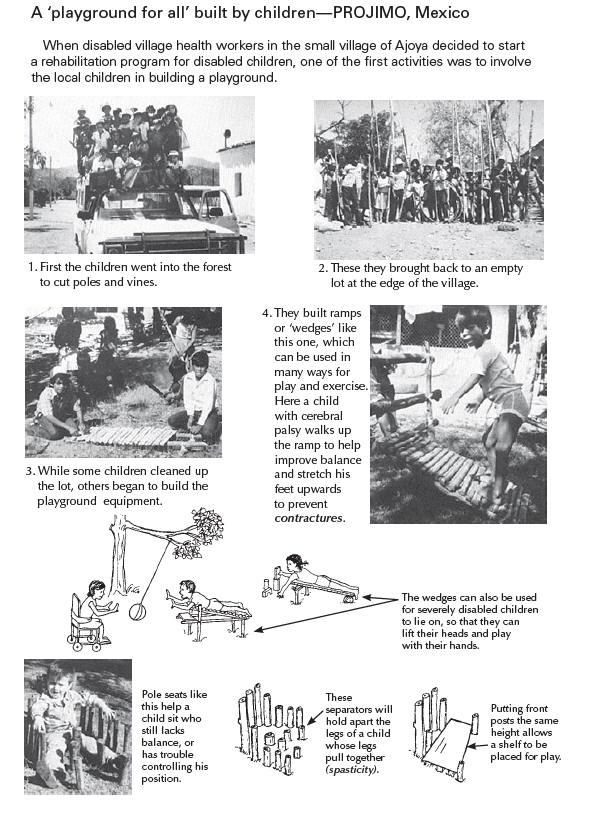 |
| from: Chapter 46 of "Disabled Village
Children" |
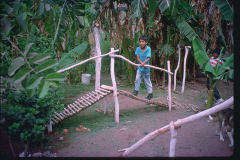
|

The beginning.
No firm date can be quoted for the start of PROJIMO. There is no formal
document that established PROJIMO as a legal entity. as of 1990, articles and
references claim that PROJIMO was started in 1981. PROJIMO grew out of proyecto
Piaxtla, a community-based health program in the Ajoya area. David Werner's
books state that: The workers in project Piaxtla were trying to take care of
disabled village children with disabilities as well as they could. Some workers
were concerned about those children not receiving the help they needed, and
decided to start a rehabilitation program.
It is quite likely that this was already happening to some extent before PROJIMO
was given an 'official' start in Summer 1982.
Martin Lamarque recalls: "By the spring of the same year,
[David Werner] had already hatched the idea of starting a rehab program in
Ajoya. The first thing he did was to organize the local kids to build the park
using local resources. We sent one local blacksmith to Thailand to learn the
bamboo leg making skills, and another one to Nicaragua to be trained in
wheelchair making. .../... It was at the beginning of September that PROJIMO got
its big launching. Therapists from Stanford came down to help with evaluations,
and over a weekend, we must have seen at least the first 40-50 clients."
What is clear from various testimonials is that:
 | PROJIMO did not spring up suddenly from a vacuum as the first
community-based rehabilitation project ever.
Already then, David Werner was traveling the world looking for ideas and
solutions, and he had already visited a variety of local projects in several
countries.
|
 | There is some contradiction about who was involved exactly when. But the
"playground for all" was built by the local children before anything else
happened.
|
 | The integration of several services (therapy, prosthetics, orthotics,
wheelchairs) was emphasized from the very start. That - together with its
unusual self-management - became the unique signature of PROJIMO. |
What made PROJIMO ultimately a household name in the CBR-context is of course
David Werner's 2 books "Disabled Village Children" and "Nothing about
us without us" and his relentless (and still-ongoing) worldwide promotion of
the ideas he presented in them.

Some of the people involved in the beginning of PROJIMO

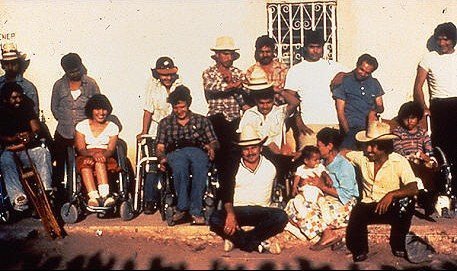 |
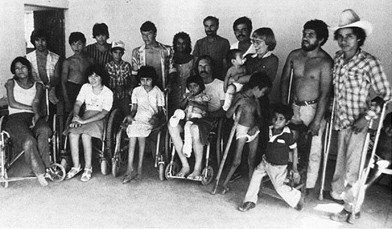 |
| PROJIMO workers in Ajoya about 1984 (?), with
Ralph Hotchkiss. |
'Disabled Village Children' p.515 |

From the introduction of "Disabled Village
Children" (1987)
Key among the PROJIMO team are: |
- Marcelo Acevedo,
- Miguel Alvarez,
- Adelina Bastidas,
- Roberto Fajardo,
- Teresa Gárate,
- Bruce Hobson,
- Concepción Lara,
- Inés León,
|
- Ramon León,
- Polo Leyva,
- Armando Nevárez,
- María Picos,
- Adelina Pliego,
- Elijio Reyes,
- Cecilia Rodríguez,
- Josefa Rodríguez,
|
- Concepción Rubio,
- Moisés Salas,
- Rosa Salcido,
- Asunción Soto,
- Javier Valverde,
- Florentino Velázquez,
- Efrain Zamora,
- Miguel Zamora.
|

From the introduction of "Nothing about us without us"
(1998)
About the PROJIMO Team |
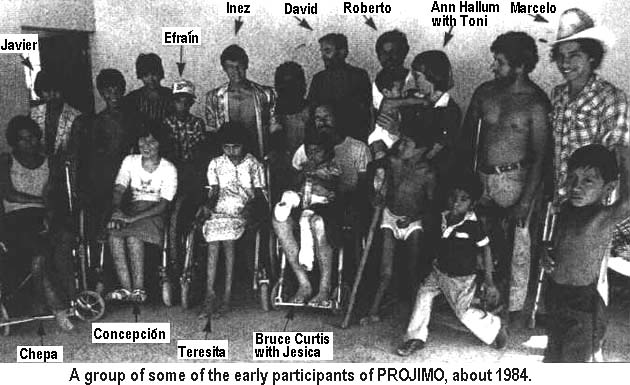 |
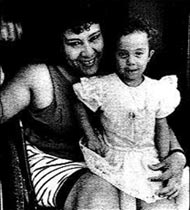 |
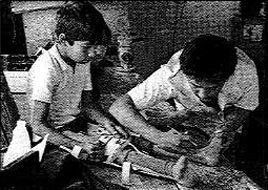 |
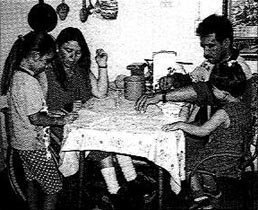 |
| Mari Picos + daughter Lluvia |
??? - Armando Nevérez |
Conchita Lara, Miguel Zamora
+ daughters Camilla + Emily |
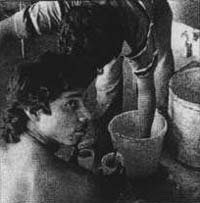 |
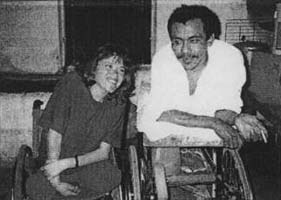 |
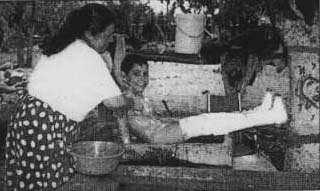 |
| Marcelo Acevedo (†2008) |
Irma Llavió (†...) + Jaime
Torres |
Rosita Salcido + patient |
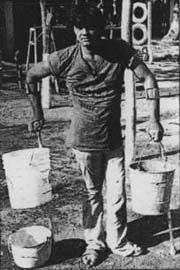 |
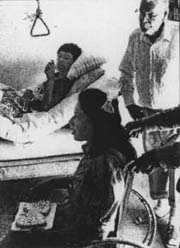 |
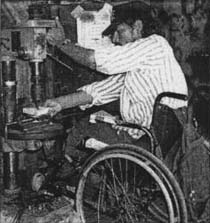 |
| Inez Leon |
Cecilia Rodriguez |
Mario Carrasco |
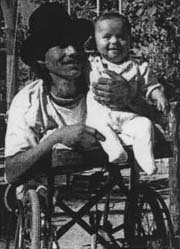 |
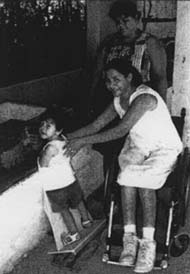 |
 |
| Martín Pérez |
Marielos Rosales, child + parent |
Polo Ribota |
|

http://www.disabilitykar.net/learningpublication/disabilityresearch.html
David Werner .../... about the proper
relationship between disabled people and 'professionals':

'…it is time for non-disabled professionals
to recognize the right of disabled persons to self control, and
therefore to gracefully step to one side, into a role where they, as
professionals, are no longer on top but rather on tap.'
|
|

Page last modified:
October 27, 2011
Return to
PROJIMO home page
Return to my homepage:
www.avemariasongs.org

|
![]()



































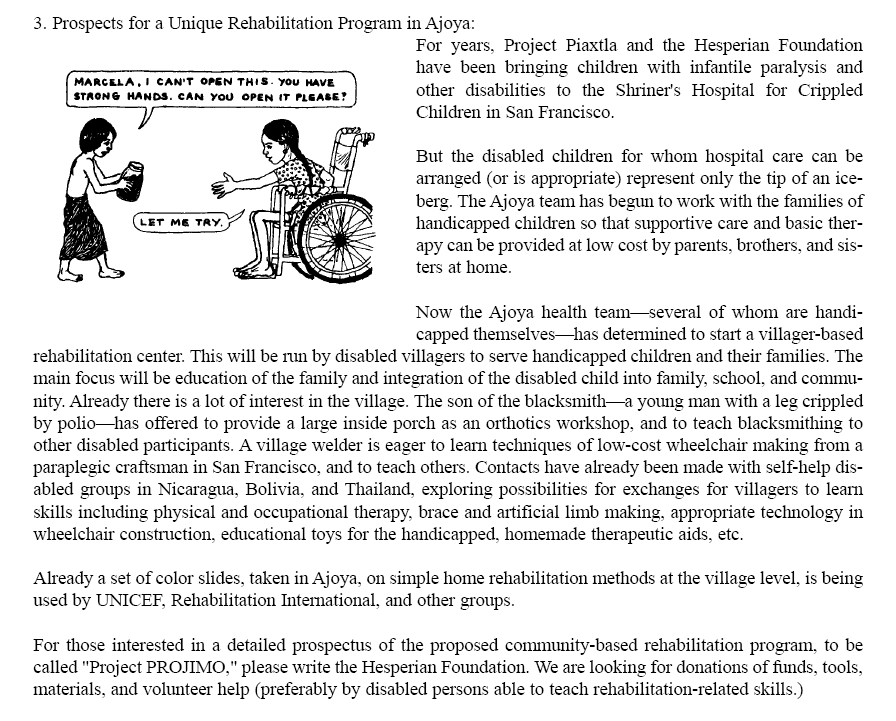



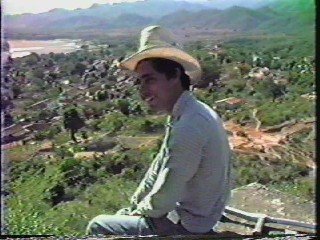
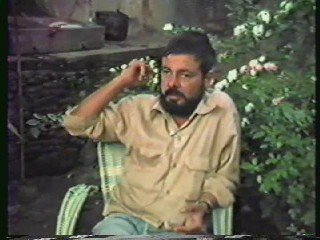
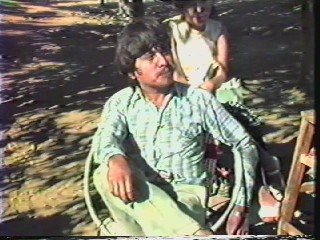
%20Rosita.jpg)

















